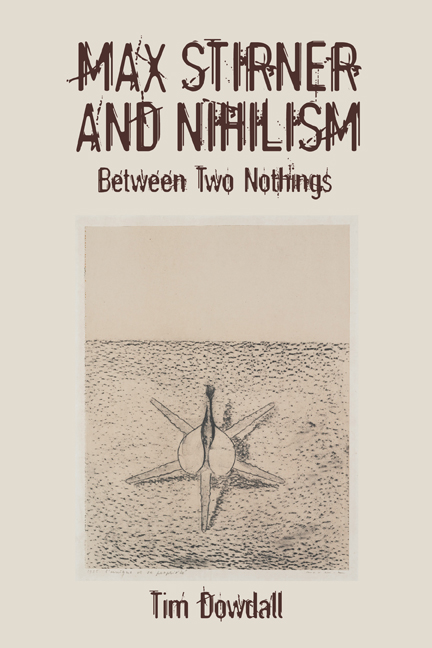Book contents
- Frontmatter
- Dedication
- Contents
- Acknowledgments
- Notes on Sources, Abbreviations, Translations, and Spelling
- Introduction: Stirner: Sinner or Saint?
- Chapter 1 The Origins of Disrepute: Stirner in Context
- Chapter 2 The Meaning of Nothing: Nihilism’s Complex Etymology
- Chapter 3 The Tragic Age for Europe: Nihilism from Nietzsche to Now
- Chapter 4 The Use and Abuse of Nihilism: Stirner under Fire
- Chapter 5 The State of Denial: Stirner and Political Nihilism
- Chapter 6 The Absence of Absolutes: Stirner and Moral Nihilism
- Chapter 7 The Fear of Nothing: Stirner and Existential Nihilism
- Conclusion: Stirner: The Happy Nihilist?
- Bibliography
- Index
Chapter 2 - The Meaning of Nothing: Nihilism’s Complex Etymology
Published online by Cambridge University Press: 09 May 2024
- Frontmatter
- Dedication
- Contents
- Acknowledgments
- Notes on Sources, Abbreviations, Translations, and Spelling
- Introduction: Stirner: Sinner or Saint?
- Chapter 1 The Origins of Disrepute: Stirner in Context
- Chapter 2 The Meaning of Nothing: Nihilism’s Complex Etymology
- Chapter 3 The Tragic Age for Europe: Nihilism from Nietzsche to Now
- Chapter 4 The Use and Abuse of Nihilism: Stirner under Fire
- Chapter 5 The State of Denial: Stirner and Political Nihilism
- Chapter 6 The Absence of Absolutes: Stirner and Moral Nihilism
- Chapter 7 The Fear of Nothing: Stirner and Existential Nihilism
- Conclusion: Stirner: The Happy Nihilist?
- Bibliography
- Index
Summary
Definitions and Interpretations of Nihilism
The vagueness inherent in nihilism's nonspecificity presents the first obstacle to assessing its relevance to Stirner's thought. Although the word has, since its invention, been in increasingly common usage, there is a remarkable amount of confusion about what nihilism actually means, and only a few of Stirner's accusers on the subject make their definitions clear. Instead, many of them seem to treat its meaning as a given, which only serves to deepen the confusion and misunderstanding. Indeed, far from leading to a reduction in occurrence, the general uncertainty around the interpretation of nihilism has resulted in its liberal and, at times, almost indiscriminate use, thus increasing both the number of possible definitions and their ambiguity. Unless this complex web of meanings is untangled, it is impossible to determine whether Stirner can reasonably be called a nihilist, a task which is made no easier by the fact that standard textbooks on nihilism fail to reach a consensus view on the question of the term's definition. In the absence of clarity, both about nihilism generally and about how it applies to Stirner, it is imperative that this study provide a comprehensive, if relatively brief, account of the history of nihilism, against which Stirner's thought can be measured.
The next two chapters will therefore be concerned with the etymology of nihilism, examining its various definitions, and tracing its development as a concept over time. The focus will be on two central and closely connected themes around which the discussion about Stirner and nihilism often revolves, namely, the relationship between atheism and nothingness on the one hand, and Nietzsche's conception of nihilism on the other. The current chapter will commence with an overview of the interpretations and connotations of nihilism and proceed to an assessment of the evolution of the concept of nihilism from its origins as a polemical term used for the excoriation of irreligion, up until Nietzsche's assimilation of the word into his philosophical project. The following chapter will then concentrate on the formation and development of Nietzschean nihilism and examine the possibility that Stirner's ideas contributed to its genesis. Armed with this knowledge, it will be possible in the following chapters to gain an insight into the different historical perspectives of Stirner's accusers and to understand the implications, and judge the veracity, of their accusations.
- Type
- Chapter
- Information
- Max Stirner and NihilismBetween Two Nothings, pp. 26 - 53Publisher: Boydell & BrewerPrint publication year: 2024



